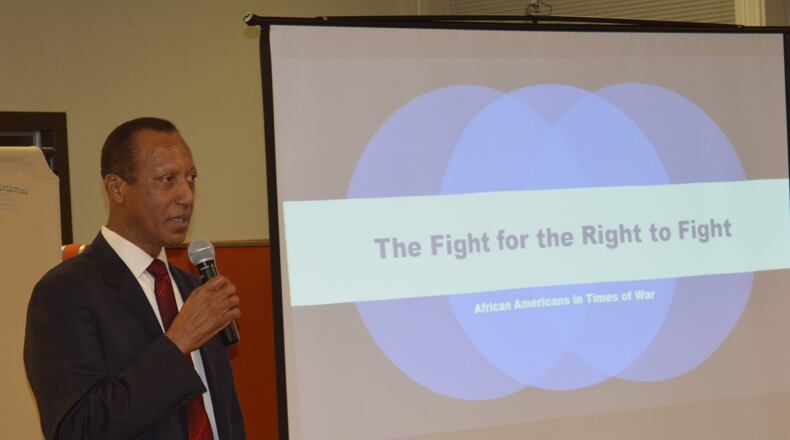He traced those contributions from the Revolutionary War through Vietnam.
MORE POPULAR STORIES
Police: Ohio teen who killed himself at school planned 8-step school shooting
He began by recounting some in his own family who have served in the military, including his mother’s maternal grandfather, Alfred Cherry, who served with U.S. troops in the Civil War. Coley said he is the youngest of 10 children — eight boys and two girls — and all eight boys were in military service, the five youngest in the Vietnam era.
One brother, Alvin, served from 1957 to 1987, including service as a master paratrooper, a Ranger and Delta Security, earning a Bronze Star, a Purple Heart and a Humanitarian Service Medal and was stationed in Florida during the 1962 Cuban Missile Crisis, standing ready to invade Cuba if that had been ordered.
Coley noted a black man, Crispus Attucks, was the first person killed in the Boston Massacre and up to 9,000 blacks served the cause in the Revolutionary War. Although representing 4 percent of the manpower in that war, they represented approximately a quarter of the total time of service due to longer service time than many others who served short times and left.
James Madison and Alexander Hamilton encouraged service by slaves, who were promised freedom in exchange for war service but most were sent back to their masters, he said.
That was the fate of many in the War of 1812, including Charles Ball, a sailor who was captured and later returned to slavery.
“The Civil War was the deadliest war and is considered the first modern war,” he said, explaining it was the first war fought using rifles instead of muskets, Gattling guns, observation balloons and other early innovations which led to increasingly more modern tools of war. “From a medical point of view, we were not ready. There were 140,000 deaths but that number may be 800,000. Many died later of disease and infection.”
Service with distinction in that war was cited for Harriet Tubman, who was a scout for black forces in the Civil War, and Sgt. William Carney, who watched his unit’s flagbearer shot down and took it leading the charge in the battle of Fort Wagner. Carney was quoted as saying later, “I did my job and the flag never touched the ground.”
“Those of you who served in the military know how important that is,” Coley said.
He told stories of the Buffalo Soldiers in the late 1800s, including Henry Flipper, the first black graduate of West Point who was drummed out of the service on a phony charge and whose court martial was overturned in 1999. In the Spanish-American War, black cavalry soldiers rode to the rescue of Teddy Roosevelt after the ride up San Juan Hill.
Eugene Bullard was a black flier in World War I but he had to join the French Foreign Legion to be able to do so, since the U.S. did not allow African Americans to fly. He was wounded twice in the war which resulted in the deaths of 16 million soldiers and civilians.
A black woman also blazed a trail in aviation but she, too, had to go to France.
Coley told of Bessie Coleman who wanted to fly from a young age and was a member of a flying club, but could not get a license to fly. She went to France and earned her pilot’s license, which the U.S. was required to honor.
“She was killed at an early age, but her legacy lived on,” he said.
World War II saw the deaths of 27,000 people every day for six years, 1939-1945, and Coley said African Americans represented the country well.
He told the story of Charles A. Anderson, a civilian pilot and member of a flying club, and “The Flight That Changed History.”
Eleanor Roosevelt, wife of President Franklin Roosevelt, was visiting the airfield where Anderson was flying and he was told in advance that if she asked for a flight to not fly her. She did ask and he ignored the advice. She flew with him for an hour and later told her husband to allow blacks to fly.
Anderson was reminded he had been told to not take her up on a flight and he reportedly responded, “She’s the boss.”
Of course, the Tuskegee Airmen distinguished themselves in flying during that war and Coley said he had a chance to meet one of the famous flying group, also called the “Red Tails” because they painted the tails of their planes that color. Their unit was deactivated in May of 1946.
Coley told of Executive Order 9981 signed by President Harry Truman in 1948 which was the first step toward integrating the military.
Coley said he loves history and reading about soldiers but said the Vietnam war means even more to him, in part because of his family’s involvement in it, but there is more.
He told of James Anderson Jr., the first African American to receive the Medal of Honor after being killed diving on a grenade to save others.
“When I think of someone like him, it does something to me,” he said. “I call Vietnam my generation’s war. It still lingers. I still feel it because of the tensions. Sixty-eight thousand Americans were killed in Vietnam. Some of them were my friends,” he said. “I’ve been in D.C. maybe 20 times in the last few years and I stop at the Vietnam Memorial every time.”
He closed by paying tribute to all who have served in the military in times of war, especially the African Americans who have contributed throughout the country’s history.
“I want all of you to know African Americans have your back,” he said.
About the Author
